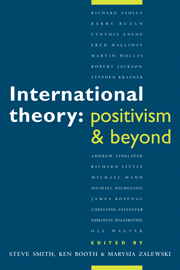Book contents
- Frontmatter
- Contents
- List of contributors
- Preface and acknowledgements
- Introduction
- I Debates
- II Legacies
- III Silences
- IV Openings
- 10 Authoritarian and liberal militarism: a contribution from comparative and historical sociology
- 11 The achievements of post-structuralism
- 12 The contributions of feminist theory to international relations
- 13 The achievements of critical theory
- V Directions
- Index
12 - The contributions of feminist theory to international relations
Published online by Cambridge University Press: 09 March 2010
- Frontmatter
- Contents
- List of contributors
- Preface and acknowledgements
- Introduction
- I Debates
- II Legacies
- III Silences
- IV Openings
- 10 Authoritarian and liberal militarism: a contribution from comparative and historical sociology
- 11 The achievements of post-structuralism
- 12 The contributions of feminist theory to international relations
- 13 The achievements of critical theory
- V Directions
- Index
Summary
‘What big teeth you have.’
‘The better to eat you with.’
(from Little Red Riding Hood)There are many texts encrusted in this simple dialogue, having to do with violence about to happen and the breakdown of security; having to do, as well, with sex, cross-species relations, gender relations, cross-dressing boundary practices, and aesthetics. Perfect for an era of feminist international relations.
Drawn together by the prospect of considering ‘our’ field at a momentous time – the seventy-fifth anniversary of official recognition, and the near turn of the century to a new millennium – ‘we’ are suddenly confronted with feminist theoretical international relations. This presence, so pleasing to some and so much the affront to others, would not have been contemplated in such a gathering ten years ago. Earnestly, ‘we’ would then have dug around realism and its neos and its world systems and its trade relations and would not have sought to understand ‘how we think or do not think or avoid thinking about gender’ (Flax, 1987, p. 622) when we think about topics near and dear to us. Now the challenge to do so is on, forced to the fore by the only theoretical orientation in international relations that takes gender as its starting point (although not necessarily as its end point) and by a field's rather abysmal record of taking gender seriously on its own.
- Type
- Chapter
- Information
- International TheoryPositivism and Beyond, pp. 254 - 278Publisher: Cambridge University PressPrint publication year: 1996
- 17
- Cited by

